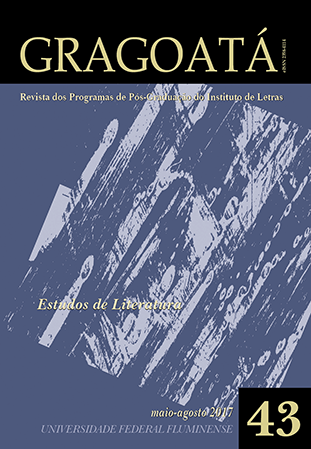El desenlace con bodas en las Novelas de Miguel de Cervantes: el ejemplo de La Gitanilla para el matrimonio feliz en las Novelas de María de Zayas
DOI:
https://doi.org/10.22409/gragoata.v22i43.33496Palavras-chave:
Novela. Casamento. Exemplaridade. Desfecho. Convenções.Resumo
En siete de las doce Novelas ejemplares (1613), de Miguel de Cervantes, la celebración del matrimonio representa el desenlace feliz. La superación de distintos trabajos y contiendas lleva a uno o múltiples enlaces. Aunque en cada trama el casamiento tenga su particular significado, siempre asegura la ejemplaridad de la fábula. Merece relieve que el matrimonio como signo de desenlace venturoso tiene otros matices en las Novelas amorosas y ejemplares (1637), de María de Zayas. El artículo analiza y compara los elementos que configuran la ejemplaridad del matrimonio en la obra de ambos novelistas. El análisis indica como María de Zayas rechaza algunas prácticas encontradas en las novelas cervantinas que configuran el final feliz con matrimonio para dar mayor autonomía a los cónyuges y restar la autoridad paterna. El estudio comparativo concluye que Zayas, posiblemente inspirada en las reivindicaciones de la Gitanilla, en sus Novelas altera significativamente las acostumbradas fórmulas de desenlace con bodas al plantear un conjunto de criterios prenupciales que llevan a sus protagonistas femeninas al matrimonio feliz.
---------------------------------------------------------------------------------
O DESFECHO DE CASAMENTO EM NOVELAS, DE MIGUEL DE CERVANTES: O EXEMPLO DE LA GITANILLA PARA O CASAMENTO FELIZ EM NOVELAS, DE MARÍA DE ZAYAS
Em sete das doze Novelas ejemplares [Novelas exemplares] (1613), de Miguel de Cervantes, uma celebração de casamento representa um final feliz. A superação de diferentes trabalhos e dificuldades leva os personagens ao casamento em mais de um momento do livro. Embora em cada trama, o casamento tenha um significado particular, ele sempre assegura um caráter exemplar ao enredo específico. É digno de nota que o casamento, como signo de desenlace feliz, possui outros matizes em Novelas amorosas y ejemplares [Enchantments of Love], de María de Zayas. O artigo busca analisar e comparar os elementos que tornam o casamento exemplar nas obras dos dois autores. A análise mostra como María de Zayas rejeita algumas práticas encontradas em nas narrativas de Cervantes que estruturam o final feliz com casamento para dar maior autonomia aos cônjuges e reduzir a autoridade parental. O estudo comparativo conclui que Zayas, possivelmente inspirada pelos desejos da Gitanilla em seu Novelas, muda significativamente sua fórmula usual de desfecho com um casamento para propor um conjunto de critérios pré-nupciais que levam as protagonistas femininas a um casamento feliz.
---
Artigo em espanhol.
---
DOI: http://dx.doi.org/10.22409/gragoata.2017n43a781.
Downloads
Downloads
Publicado
Edição
Seção
Licença
AUTORIZAÇÃO
Autores que publicam em Gragoatá concordam com os seguintes termos:
Os autores mantêm os direitos e cedem à revista o direito à primeira publicação, simultaneamente submetido a uma licença Creative Commons Atribuição 4.0 Internacional (CC BY 4.0), que permite o compartilhamento por terceiros com a devida menção ao autor e à primeira publicação pela Gragoatá.
Os autores podem entrar em acordos contratuais adicionais e separados para a distribuição não exclusiva da versão publicada da obra (por exemplo, postá-la em um repositório institucional ou publicá-la em um livro), com o reconhecimento de sua publicação inicial na Gragoatá.
A Gragoatá utiliza uma Licença Creative Commons - Atribuição CC BY 4.0 Internacional.











